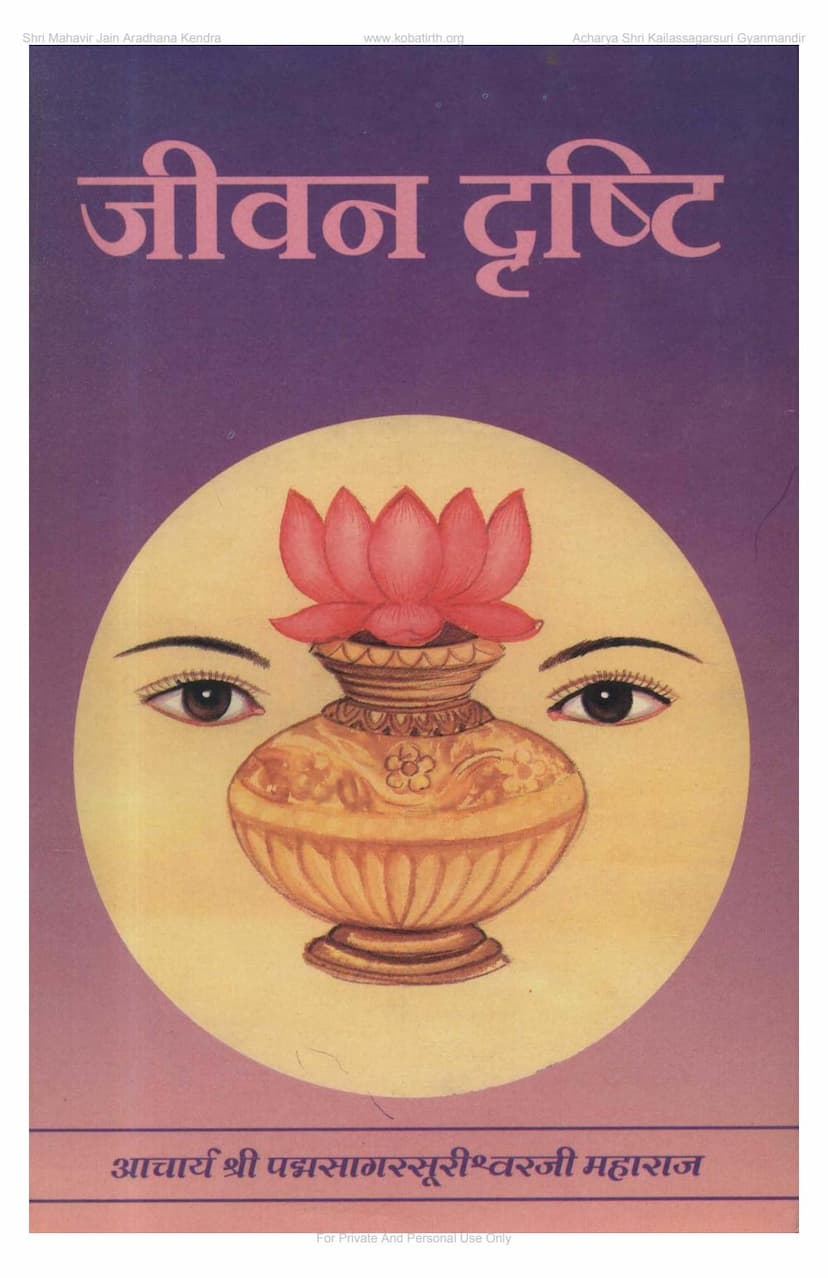Jivan Drushti
Added to library: September 2, 2025

Summary
"Jivan Drushti" (Life Vision) by Acharya Shri Padmasagarsuri is a compilation of discourses delivered during the Chaturmas (a four-month period of spiritual retreat) in Pali, Rajasthan, in the year 2040 of the Vikram Samvat era (1984 CE). Published by Arunoday Foundation, this book aims to provide readers with a new perspective on life, enabling them to see the "self in the all and the all in the self."
The book emphasizes that the teachings of the liberated soul (Arihant) are a guiding light, illuminating the path of life. Acharya Shri Padmasagarsuri draws parallels between the nourishing rain and the enlightening discourses of spiritual leaders, asserting that just as collected rainwater sustains life, compiled discourses from realized beings continue to quench the thirst of spiritual seekers for generations.
Key Themes and Concepts:
- The Power of Discourse: The book highlights the transformative power of spiritual discourses, likening them to a "paras stone" that can turn base metal (the mind) into gold (spiritual purity). It stresses that absorbing even a small portion of the discourse can bring purity and stability to the mind.
- Mind as a Vessel: The mind is depicted as a vessel that needs to be purified and stabilized to experience the soul. Just as clear water reflects the face, a pure mind allows for self-realization.
- The Parrot Analogy: A significant analogy used is that of a parrot trained to speak "freedom" but remaining in a cage. This illustrates the state of many individuals who speak of renunciation and liberation but remain bound by worldly attachments and habits. The discourses are presented as the "treatment" that can help break these bonds.
- Timeliness of Spiritual Awakening: The author emphasizes the importance of seizing the moment of spiritual awakening ("masaniya vairagya") and immediately seeking guidance from a spiritual master, likening it to striking iron while it is hot.
- The Nature of Dharma: Dharma is defined not just as rituals but as the inherent nature of the soul and the means to realize it. It's about inner purity and the cultivation of virtues. The book contrasts external religious practices with the inner purity that truly constitutes dharma.
- The Importance of Maitri (Friendliness): Jain philosophy's emphasis on universal friendliness (Maitri) is presented as the birthplace of dharma. This concept extends to even relationships with inanimate objects and the importance of cherishing even a small spark of divine thought.
- Character and Conduct (Achar): The book strongly advocates for the cultivation of character and virtuous conduct (Achar) as the foundation of spiritual life. It highlights the examples of great souls like Rama and Lakshmana, whose lives exemplify adherence to principles and selfless duty. The author laments the decline of character in contemporary society.
- Tapa (Austerity) and Sadhana (Spiritual Practice): The book delves into the significance of austerities and spiritual practices within Indian culture, particularly in Jainism. It explains that these practices are not mere self-mortification but a means to purify the soul by shedding karmic matter.
- The Power of Devotion (Bhakti): Bhakti is described as the surrender of the self, leading to the destruction of ego and the attainment of peace. Devotion to the Tirthankaras (liberated souls) is presented as a path to overcome worldly attachments and achieve liberation.
- The Role of Music and Sound: The book touches upon the spiritual significance of classical Indian music and the power of sacred chants and sounds in attracting divine consciousness.
- Mindfulness and Concentration: It stresses the importance of concentrating the mind through practices like meditation and mantra repetition, highlighting that true devotion comes from a focused mind, not just mechanical recitation.
- The Impact of Speech (Vani): The book emphasizes the power of speech, advocating for meaningful, concise, and benevolent communication (Maitrabhashita) while warning against unnecessary talkativeness and harsh words. It provides examples of how thoughtful speech can influence and transform individuals.
- The Value of Charity (Dan): Dan is presented as a significant virtue, highlighting that even a small act of charity, when performed with sincerity, can have profound results.
- The Illusion of Material Wealth: The futility of accumulating worldly possessions is underscored, with the example of King Bhoj showing that true wealth lies not in hoarding but in righteous giving and the acceptance of impermanence.
- The Importance of Discipline (Niyam): The book stresses the need for discipline in daily life, including adherence to dietary rules like avoiding night meals, and the significance of regularity in spiritual practices.
- The Power of a Pure Heart: Ultimately, the book advocates for inner purity, selfless action, and unwavering faith in the divine as the keys to a fulfilling spiritual life and liberation.
In essence, "Jivan Drushti" by Acharya Shri Padmasagarsuri serves as a spiritual guide, offering practical wisdom and profound insights drawn from Jain teachings to help individuals transform their lives and achieve spiritual upliftment.